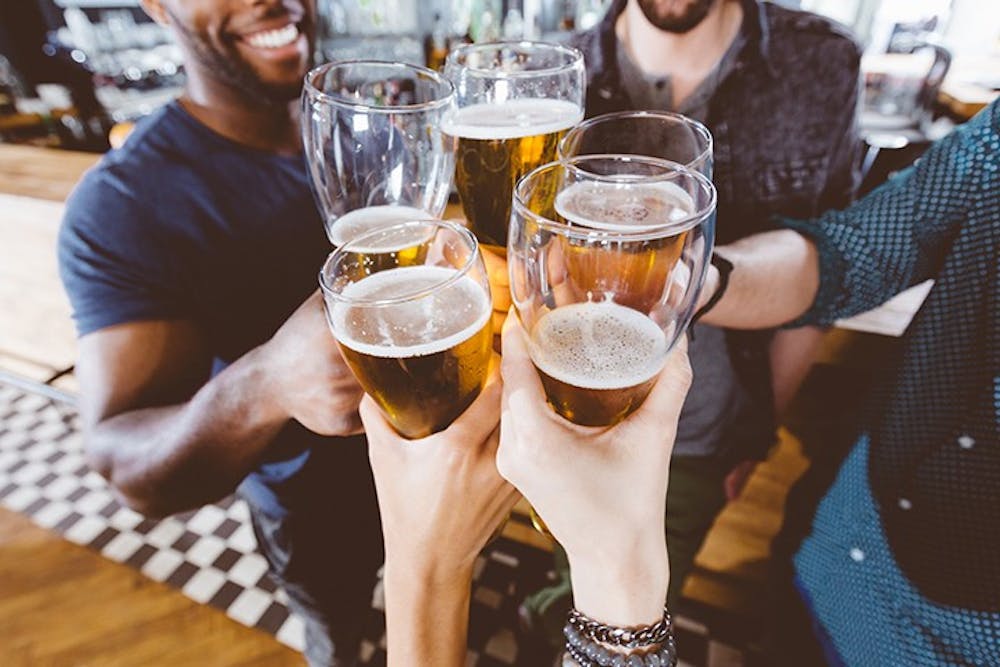St. Patrick's Day is one of the most popular days for drinking. The occurrence of binge drinking that happens at St. Patrick's Day celebrations, both large and small, is dangerous. Binge drinking culture can and should be shifted by changing how we celebrate holidays such as St. Patrick's Day. The most important part of celebrating is spending quality time with loved ones rather than being intoxicated.
Annually, Five Points runs a St. Patrick’s Day celebration. This year, the event has been postponed due to the COVID-19 pandemic. But in the past, the event has brought out over 40,000 attendees each year. This turnout is not uncommon for St. Patrick's Day celebrations, which often focus on large public gatherings, as events such as these often encourage social drinking. Major sponsors of the Five Points event from previous years include Budweiser, Bud Light and Tito’s Vodka.
Social drinking isn’t dangerous, and drinking alcohol is not a bad thing. But what makes drinking dangerous is when it is overdone. Having one to two drinks is a moderate amount, but when the amount consumed increases in a short time frame, risk increases.
Drinking culture is dangerous, and its normalization among young people makes it difficult to stop. Its appearance in many social activities, such as going to bars or large parties, makes it more accessible and accepted. These social activities increase during holidays such as St. Patrick's Day, where events based around drinking are common. Events such as themed bar crawls and festivals give easy and quick access to alcohol.
From symptoms such as nausea and memory loss to drunk driving and alcoholism, there are a lot of risks that come with excessive drinking. According to the 2018 National Survey on Drug Use and Health, 36.9% of full-time college students engaged in binge drinking in the past month. Additionally, 9% of full-time college students meet the criteria for alcohol use disorder, according to the National Institute on Alcohol Abuse and Alcoholism.
Changing how our society views drinking is important for lowering the rate of binge drinking and alcohol addiction and dependency. This means focusing less on drinking at social gatherings. One of the best ways to do this is to change your focus or goal of attending the event.
Prioritize enjoying yourself and the experience over getting intoxicated. Drinking itself is not an issue. Cutting out alcohol does not have to be the answer; rather, reducing the amount you are drinking at one time. What is most important is to not rely on it to enjoy an experience.
This St. Patrick's Day, a big step you can take to changing drinking culture is finding alternative ways to celebrate.
Baking can be a wonderful way to enjoy the holiday. Make a batch of traditional Irish soda bread with some friends and family. If you do enjoy making drinks but want to avoid the alcohol, there are plenty of St. Patrick's Day themed mocktails that can be fun to create and drink. New traditions don’t have to be boring and could create new memories for the upcoming year.
This separation takes time, especially when St. Patrick’s Day is so interwoven with drinking. But perhaps this year will lead to a difference. With many of the large gatherings being postponed or cancelled, the catalyst for binge drinking is lessened. Of course, it can’t be fully prevented, but smaller gatherings could allow you to control your rate of drinking and the activities you partake in.
Truly, change starts with the students themselves. Taking the initiative to reduce your drinking or organize events with little to no drinking can spark a change. Host your own small, socially-distanced gathering with new traditions. Even doing something small like having alcohol-free alternatives at your St. Patrick's Day celebration can help change drinking culture by giving different choices. Small actions, such as choosing to drink less on certain days, will create a healthier relationship with alcohol. This ensures that you can enjoy yourself — and drink responsibly — at the same time.

